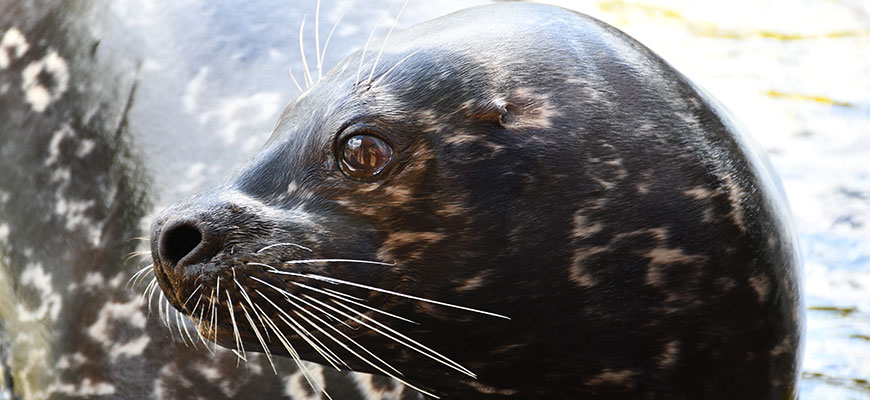RANGE
Harbor Seals can be found in temperate, subarctic and arctic waters of both the North Atlantic and North Pacific oceans, and as far south as the California Coast and Baja California.
HABITAT
Harbor Seals can generally be found in shallow estuaries, rivers and places where sandbars and beaches are covered at low tide.
SIZE
Average 5 to 6 feet (1.7 – 1.9 m) in length and can weigh up to 300 pounds. Males are usually slightly larger than females.
LIFE EXPECTANCY
Harbor seals may live a maximum of about 25 to 30 years.
REPRODUCTION
- Males reach sexual maturity when they reach about 165 pounds, at about 3 – 7 years of age.
- Females reach maturity at around 110 pounds, at around 3 – 6 years of age.
- Timing of births varies with latitude. Generally it occurs between February and June.
- Gestation is one year with a period of delayed implantation. Actual fetal development is only about 9 – 10 months.
- Babies are born weighing between 12 to 20 pounds, about 2 feet long, and are able to swim immediately after birth. Pup mortality is about 21% in the first year of life.
- Females generally give birth to one pup each year. If twins are born, the strongest pup will be cared for and the other left to die.
DIET
Wild: Crustaceans, squid, mollusks and a variety of fish, including rockfish, herring, flounder, salmon, sand lance & hake.
Zoo: Frozen Fish, variety of sea food.
BEHAVIOR
- Pacific harbor seals spend about half their time on land and the other half in the water.
- Dives generally last between three to seven minutes, however on deep dives they have been known to stay down for close to 40 minutes.
- They will sleep underwater.
- Are wary of people and avoid contact.
POINTS OF INTEREST
- Unlike many other pinnipeds, harbor seals are usually solitary and rarely interact with others except to mate.
- Harbor seals have whiskers or “vibrissae” that help the animals with a sense of touch, and are used in helping them find food.
- Harbor Seals propel themselves using their hind flippers, and are known to swim up to 12 mph.
- They can dive to depths of almost 1500 feet (457 m).
- Their specialized blubber allows them to maintain a core body temperature of 100 degrees, despite the cold water in which they are usually found.
- Harbor Seals do not migrate.
- Harbor seals have a keen sense of hearing, and are considered a true seal due to the lack of external ear flaps.
STATUS
Stable. Protected under the Marine Mammal Protection Act (MMPA)
REFERENCES
http://marinemammalcenter.org/education/marine-mammal-information/pinnipeds






